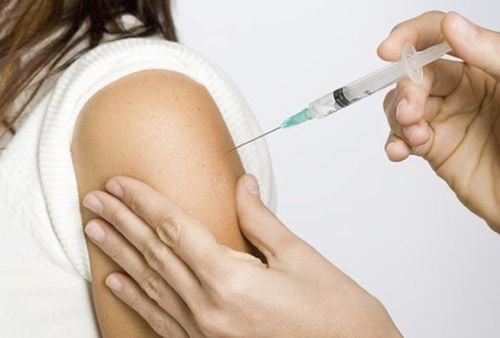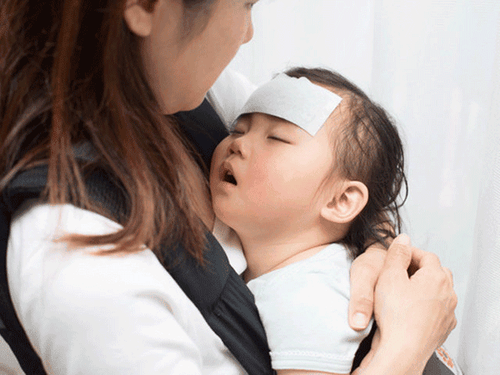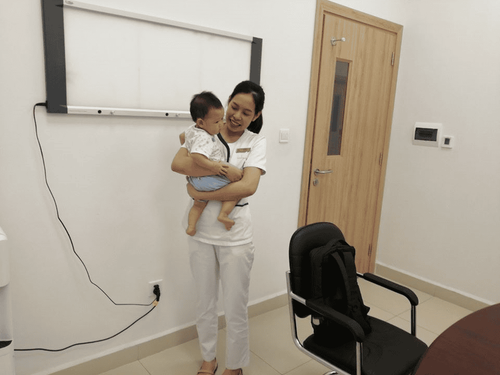This is an automatically translated article.
Posted by Specialist Doctor II Pham Do Ngoc Diep - Neonatologist - Neonatology Department - Vinmec Times City International Hospital
In the first years of life, the child's resistance and immunity are not yet complete, so it is easy to catch life-threatening infectious diseases. Therefore, vaccination is the best way to build a child's immune system against disease. So what do parents need to know before vaccinating their babies?
1. Risks of vaccination for premature babies
Premature / low birth weight babies are babies born before 37 weeks of gestation and weigh less than 2500 grams. Premature babies are susceptible to several vaccine-preventable diseases such as whooping cough, Haemophilus Enzae type b (Hib), pneumococcal disease, and influenza. Not stopping there, babies born prematurely and with low birth weight are at increased risk of serious complications from vaccine-preventable diseases. than full-term infants.
Vaccines are immunogenic, safe and well tolerated in preterm infants. Premature infants should be vaccinated using the same schedule as is generally recommended for term infants, with the exception of hepatitis B vaccine, where an additional dose should be given in infants receiving the first dose. in the first days of life if the body weight is less than 2000g, because the immune response is reduced.
Vaccines in preterm and/or low birth weight infants are as safe as full-term infants, except for the potential for a temporary increase or recurrence of apnea after vaccination. Accordingly, apnea may or may not be accompanied by bradycardia up to 48 hours after vaccination with 5-in-1 or 6-in-1 vaccine.

1.1. Possible risk factors for apnea after vaccination
Had a previous episode of apnea 24 hours Severe illness after birth Age less than 67 days postpartum or born prematurely with a birth weight <1500g Had an episode of apnea after the first dose of vaccine
1.2. Apnea monitoring is recommended
Close follow-up immediately after the first injection If breathing has stopped after the first injection, the following doses must also be closely monitored. No sequelae if there is a seizure after vaccination No need to stop/delay injection/ omit the injection
1.3. Undesirable reactions after vaccination (Anaphylaxis)
Very rarely, if any occurs quickly with severe symptoms: Cardiovascular collapse, pale skin, not alertness, weak pulse. Rapid appearance of other signs: redness of the extremities, upper airway obstruction, baby crying. At this time, it is necessary to quickly manage by calling for support, using adrenaline with a concentration: 1/1000, dose: 0.05-0.1 ml (0.01 ml/kg), deep intramuscular injection. Frequency of administration: Every 5 minutes until good cardiac output.

2. Recognizing abnormal reactions after injection
Children after vaccination need to stay at the vaccination site for 30 minutes for medical staff to monitor and promptly handle if any unusual reactions occur.
Accordingly, parents need to continue to monitor their children after vaccination regularly at home within 1-2 days after vaccination for signs: mental, breastfeeding, eating, sleeping, breathing, temperature, development rash, reactions at the injection site, ... to be able to detect early signs of abnormal health.
If the child has a fever after the injection, it is necessary to take a temperature and monitor, use antipyretic drugs for the child according to the instructions of the medical staff. Parents should be careful not to put anything on the injection site. Then, take the child to the nearest hospital or medical facility if the child has signs such as: high fever (≥ 39°C), convulsions, rash, screaming, cyanosis, difficulty breathing, vomiting lethargy, fatigue, poor feeding, aborting, ....or when the usual reaction persists for more than 1 day
3. How important is pre-vaccination screening for premature babies?
Pre-vaccination examination for premature babies is very important, especially the first vaccinations. When examining, the doctors will understand the condition, see if the child is healthy, eligible for vaccinations or not? Is there any risk after the injection will happen through taking the history of pregnancy, birth of the child.
Accordingly, premature babies will be contraindicated when they have a high fever or are being treated for a congenital disease that can cause a reaction to the vaccine. In fact, vaccination for premature babies should not be delayed but should be done at the right time to promptly build immunity to protect the child's weak body against pathogens. However, if your child is in the following situations, you should consider vaccinating your child:
Have had a history of post-vaccination reactions in previous vaccinations.
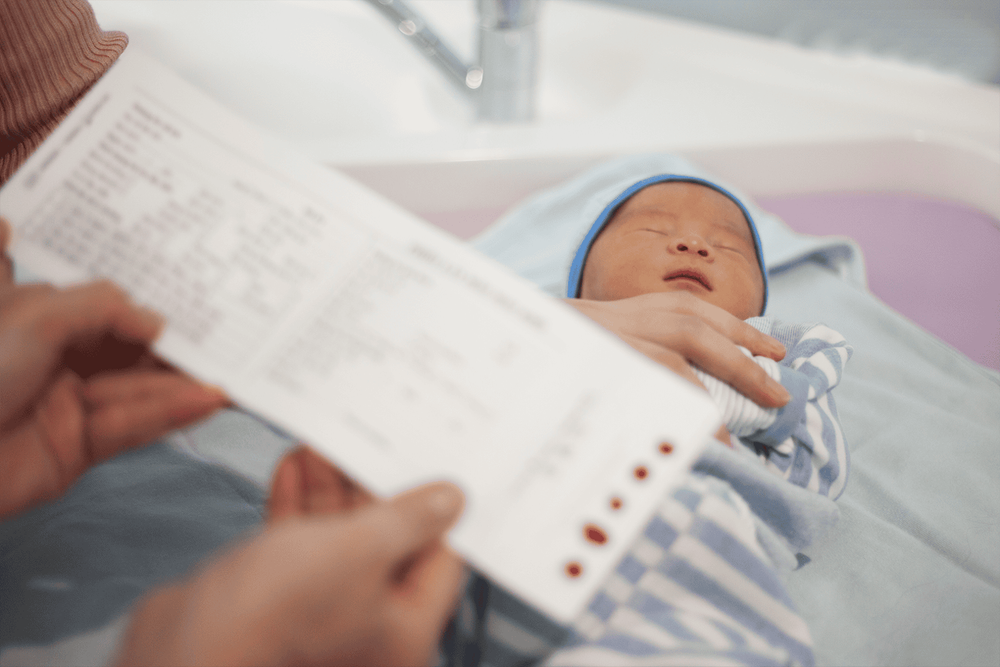
Experiencing anaphylaxis or anaphylaxis when using drugs or foods Premature babies who are being treated with immunosuppressive drugs or cancer drugs should not be vaccinated because their immune systems are greatly weakened. Children are suffering from acute diseases, high fever Babies born too prematurely.
4. What do parents need to prepare for their baby before vaccination?
To best prepare your baby for vaccinations, parents need to note some of the following:
4.1 Checking the baby's health status
In the last 3 days, has your baby had a fever? Is your child's weight > 2000 g? Does the child have an acute bacterial infection? Is your child suffering from pyoderma or eczema? Newly recovered children are still in the recovery period? On a case-by-case basis, the doctor will review the child's condition and decide whether to vaccinate or not?

4.2. What do I need to do when I go to vaccinate my child?
Parents need to bring their child's immunization record or immunization record: Immunization books and immunization records are extremely important and should be kept carefully. The information in it will help the doctor consult for parents to choose the optimal vaccination plan for their child Notes on the medicines the baby is using or has used for more than 2 weeks: Some medicines when Using it will reduce the effectiveness of the vaccine, so this is also important information that parents need to tell their doctors and healthcare workers. In addition, before vaccination, parents need to clean the child's body to limit infection. In addition, avoid giving the child too much food, but also do not let the stomach go hungry because it may make the child starving after the injection.
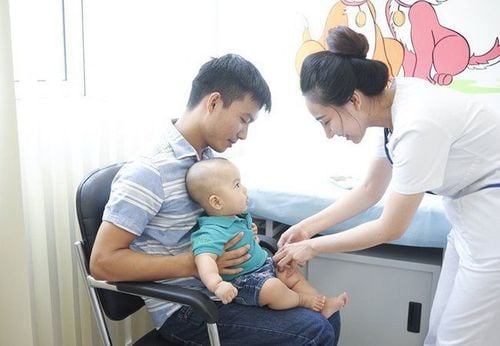
Vinmec International General Hospital has been deploying immunization services with a variety of vaccines for different audiences, from infants, young children, adults, and women before and during pregnancy pregnant. This includes vaccines against many diseases. The advantages of vaccination at Vinmec include:
Children will be examined by pediatricians - vaccines, fully screened for physical and health problems, and advised on vaccines. disease prevention and injection regimen, how to monitor and care for children after vaccination before giving the indication for vaccination according to the latest recommendations of the Ministry of Health & World Health Organization to ensure the best effectiveness and safest for children. A team of experienced and professional pediatric doctors and nurses, understand children's psychology and apply effective pain relief methods for children during the vaccination process. 100% of vaccinated children were monitored for 30 minutes after vaccination and reassessed before leaving. Undertake medical supervision before, during and after vaccination at Vinmec Health System and always have an emergency team ready to coordinate with the vaccination department to handle cases of anaphylaxis, respiratory failure - circulatory arrest, ensuring Ensure timely and correct handling when incidents occur. The vaccination room is airy, with a play area, helping children feel comfortable as if they are walking and have a good mentality before and after vaccination. Vaccines are imported and stored in a modern cold storage system, with a cold chain that meets GSP standards, keeping vaccines in the best conditions to ensure quality. Parents will receive a reminder message before the vaccination date and their child's vaccination information will be synchronized with the National Immunization Information System. In the first years of life, children's resistance and immunity are not yet complete, so they are easy to catch life-threatening infectious diseases: diarrhea, chickenpox, encephalitis, whooping cough, measles, .. .So, schedule your baby's vaccination package at Vinmec so that the child can develop the healthiest and most comprehensive.
Please dial HOTLINE for more information or register for an appointment HERE. Download MyVinmec app to make appointments faster and to manage your bookings easily.
Negligence in vaccination – late regret
SEE ALSO:
Vaccines that must be given to children before 12 months of age Tips to mothers about vaccinations to protect children for life after birth?






